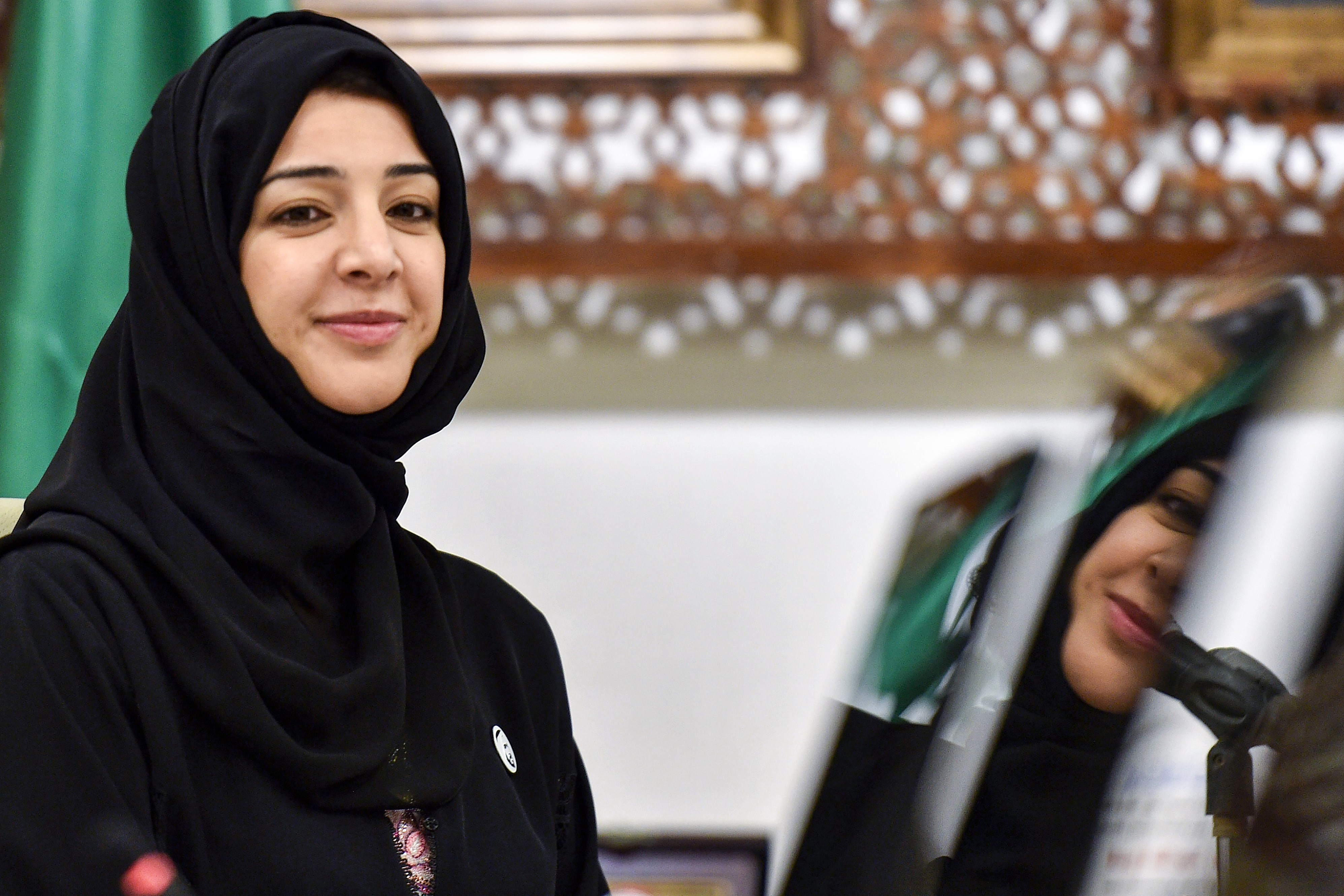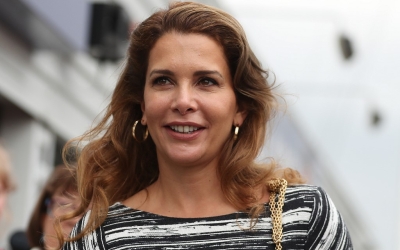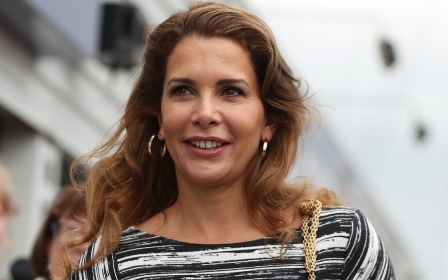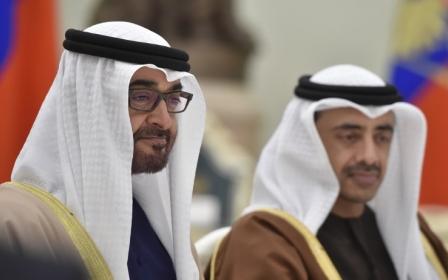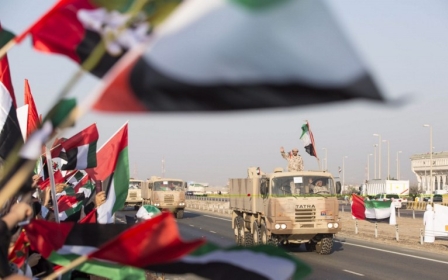The UAE’s latest soap opera - and what was that about women’s rights?

Earlier this summer, Palestinian-Dutch-American supermodel Bella Hadid posted an Instagram Story featuring her shoe against a backdrop of an airport runway on which an Emirati and Saudi airplane were parked.
This led to calamity as Twitter erupted in accusations of Hadid’s “racism”. Of course, if photographing footwear is racist, one can only surmise as to what the proper descriptor might be for the manic Saudi-Emirati bombardment and starvation of Yemen.
Underhanded blow
Meanwhile, in other Gulf-related news of the rich and famous, the United Arab Emirates was recently dealt another underhanded blow by its very own Princess Haya, the sixth-or-so wife of Dubai ruler and prolific poet Sheikh Mohammed bin Rashid al-Maktoum.
The defection of Princess Haya is a good occasion to contemplate the Emirates’ self-portrayal as an island of women’s rights in the midst of a gulf of oppression
The princess, daughter of the late King Hussein of Jordan, is currently reportedly “in hiding” in an £85m ($106m) townhouse in London, where, according to a source cited by the New York Times, she is seeking political asylum as well as a divorce.
New MEE newsletter: Jerusalem Dispatch
Sign up to get the latest insights and analysis on Israel-Palestine, alongside Turkey Unpacked and other MEE newsletters
There are varying hypotheses as to the motives behind Princess Haya’s flight, many involving the idea that she had “discovered disturbing facts” (BBC) about last year’s failed escape attempt by Sheikha Latifa, one of Sheikh al-Maktoum’s numerous offspring, who was intercepted off the coast of India and forcibly returned to the UAE.
As the New York Times notes, Princess Haya is “at least the third woman to flee Sheikh Mohammed’s palaces in Dubai”. Granted, given the present context of Europe’s lethal war on refugees, one might find it difficult to muster much empathy on behalf of someone pursuing political asylum from within an £85m property in the UK.
But the defection of Princess Haya - not to mention less-high-profile escapes from the UAE of females claiming domestic abuse - is at least as good an occasion as any to contemplate the Emirates’ self-portrayal as an island of women’s rights in the midst of a gulf of oppression.
Second class citizens
In 2015, for example, Sheikh al-Maktoum established the Gender Balance Council in order to “empower women”.
According to the gender equality section of the Official Portal of the UAE Government, the aim of the council is to “enhance work environment [sic] by giving women equal opportunities in the public sector” and to “boost the country’s efforts to evolve and enhance women’s role as key partners in building the future of the nation”.
Sounds great. But this January, Sheikh al-Maktoum handed out gender equality awards - and they went entirely to men.
As part of its Vision 2021 programme, the UAE furthermore “aims to become one of the world’s top 25 countries achieving gender equality” by the specified year, although it’s unclear what gender equality even means in a place where women are second-class citizens.
Nothing spells happiness like a police state in which every inhabitant is subject to nonstop surveillance and freedom of expression is criminalised
As Human Rights Watch Middle East researcher Hiba Zayadin observes in a new opinion piece, women are also discriminated against in divorce.
Noting that Princess Haya’s two children are accompanying her for the moment, “the same cannot be said for many mothers in the UAE who have lost the fight to keep their children with them”.
Obviously, female migrant workers in the UAE have extra categories of horrors to contend with, ranging from unpaid wages to impossibly extended workdays to physical and sexual violence.
A grim reality
Luckily, the grisly reality of life in the Emirates is nothing a bit of hardcore propaganda can’t take care of. Emirati publications continuously churn out glowing coverage of the authoritarian regime’s oh-so-progressive undertakings, while devoting much attention to the notion that the UAE is “one of the happiest countries in the world”.
This is presumably thanks in part to the existence of a Minister of State for Happiness and Wellbeing, who is - you guessed it! - a woman. As I’ve said before, nothing spells happiness like a police state in which every inhabitant is subject to nonstop surveillance and freedom of expression is criminalised along with other basic rights.
And speaking of police, there’s plenty of room for “gender equality” in that realm, too. A January Khaleej Times article rebutting the suggestion that it is ridiculous to give gender equality awards only to men, quoted the UAE’s Gender Balance Council on how the country was “raising the participation of women in the police force to become the highest in the Arab world”.
The Emirates Woman magazine also references an “all-female police force” as one of the reasons the UAE is a bastion of women’s rights in the Middle East - in an article titled “Who Run The UAE? Women… Soon”.
Other nauseating magazine offerings include “Why It Rocks To Be A Woman In the UAE” - courtesy of “International Woman” Rachel Hamilton - and “11 moments Sheikh Mohammed and Princess Haya were the perfect couple”, most of which moments appear to have transpired during exclusive horseracing events in the UK.
A model society?
For its part, the UAE government portal boasts that the country has “opened the region’s first military college for women, Khawla bint Al Azwar Military School”. After all, as in the US, female empowerment is greatly boosted by equal-opportunity killing.
But I’d wager that the countless female victims of the Western-backed, Saudi-Emirati-led slaughter-fest in Yemen are probably not too convinced of the UAE’s overwhelming commitment to female wellbeing.
To be sure, the West is keen to endorse the image of the UAE as ultra-modern and civilised in every way - from malls with ski slopes to women’s rights - as it facilitates the justification for nefarious military collaboration.
And as it so happens, the UAE is a model society when it comes to the militant capitalism that so appeals to the global elite minority, who delight in euphemising its brutality.
Of course, the UAE’s “democratic” buddies aren’t so good at women’s rights either - following a cabinet reshuffle in 2017, the Emirati media were quick to point out that the UAE cabinet was “more gender-equal” than Donald Trump’s.
In December, meanwhile, a move to give 50 percent of seats in the UAE’s Federal National Council to women was celebrated by Sheikh al-Maktoum on Twitter: “Women are half of our society: they should be represented as such."
But as even the plights of the ruler-poet’s own privileged female family members demonstrate, half doesn’t mean equal.
The views expressed in this article belong to the author and do not necessarily reflect the editorial policy of Middle East Eye.
Middle East Eye delivers independent and unrivalled coverage and analysis of the Middle East, North Africa and beyond. To learn more about republishing this content and the associated fees, please fill out this form. More about MEE can be found here.



